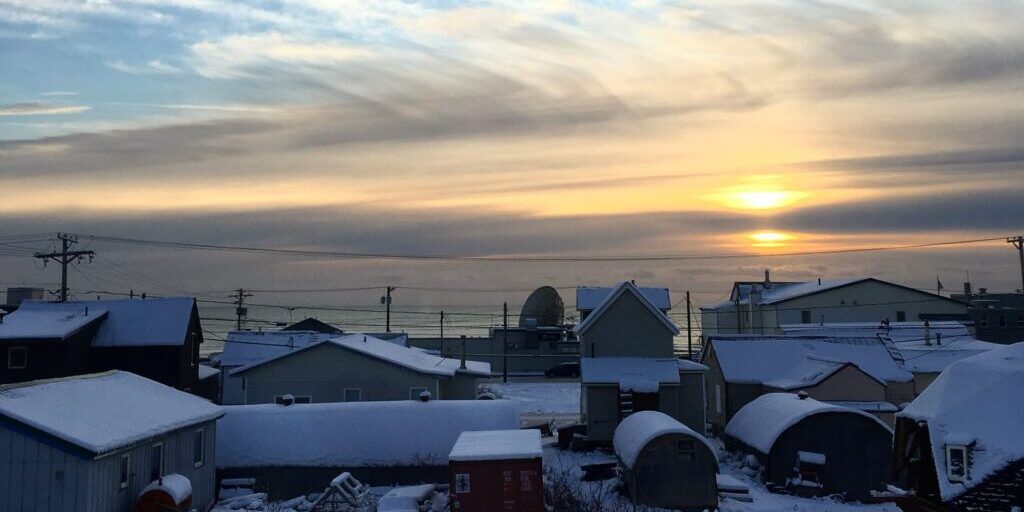On April 14th, 2020 residents learned that someone in the Norton Sound region tested positive for the novel coronavirus. Shortly after, they learned it was a GCI employee who lived in Nome but hadn’t traveled recently. That meant COVID-19 was present and spreading within the community.
But throughout the pandemic so far, the Norton Sound region has been relatively lucky. There have been no deaths reported for any regional residents. As of this week, Norton Sound Health Corporation (NSHC) has reported a total of 338 positive cases of COVID-19 since the first confirmed case in April 2020. Six people have been hospitalized.
Most communities quickly moved to institute restrictions on travel. Nome passed an emergency order in March 2020 that gave the city manager authority to ask all Nome-bound travelers to quarantine for 14-days upon arrival. As COVID-19 testing became more widely available, that quarantine requirement was narrowed down to seven days for travelers who received negative COVID-19 tests. Since March of 2020, incoming travelers to Nome have been asked to fill out forms detailing their quarantine plans and for purposes of contact tracing.
Just in case we’re able to pin-point exactly who was where and when, then we can reach out to them and let them know that they’re possibly compromised.
– Rose Reale, Nome Emergency Services Technician

Gambell, on St. Lawrence Island, had one of the worst outbreaks in the Norton Sound region and went quickly into lockdown. In the first week of October, NSHC reported that entire households were testing positive for the virus. Gambell resident Charlotte Apatiki told KNOM at the time that the lockdown was exacerbating an already delicate food chain supply.
“We haven’t had any eggs and fresh produce in quite a while.”
– Charlotte Apatiki in Gambell, October 2020
Gambell had faced problems with a broken fuel line earlier that year which impacted how much fuel hunters had to gather subsistence foods. Once lockdown started in October, Apatiki said families were relying on traditional foods.
“Most of us, if we were lucky to have gas during the spring harvest, are living on Native foods and fish.”
The Native Village of Gambell and many other Tribes used their CARES Act funding to give Tribal members checks to buy groceries, cleaning supplies, and other essentials a family would need to weather the pandemic. NSHC was able to send “care packages” of non-perishable foods to some homes.

In Stebbins, residents faced similar challenges with food insecurity during at least one of their lockdowns. The road to neighboring St. Michael was closed. Many residents relied on going to St. Michael to shop at the larger Alaska Commercial Company grocery store.
Ward Walker of Stebbins helped set up a checkpoint where supplies could be delivered while maintaining social-distance.
“People could purchase food in St. Michael for those three weeks and then have it delivered to the check-point.”
– Ward Walker in Stebbins, August 2020
But Stebbins doesn’t have running water or indoor plumbing which made following public health advice to “wash your hands” regularly more of a challenge.
Leaders in Stebbins and health professionals at NSHC set-up hand-washing stations to help combat the outbreak. Sean Lee works with the Environmental Health department at NSHC.
“It [the pandemic] has really highlighted the need for water in unserved communities because the outbreaks in Gambell and the outbreaks in Stebbins are mostly related to not having adequate water for handwashing.”
– Sean Lee, NSHC Environmental Health, October 2020
The City of Nome had its worst outbreak of COVID-19 in mid-November that resulted in almost 100 people testing positive for the virus over the course of three weeks. The outbreak kept bars and restaurants closed for the entire winter holiday season.

But weeks later, the Norton Sound region would begin to see hope. On December 17th, NSHC received 975 doses of the PfizerBioNTech COVID-19 vaccine. Phillip Dexter – a 96-year-old Elder from Golovin — was the first resident of the Quyanna Care Center in Nome to be vaccinated.
He had three words for the nurse after his injection:
“That was fun!”
-Phillip Dexter, Nome, December 2020


The Pfizer and Moderna vaccines are now available to anyone in Alaska who is of the eligible age requirement. The Pfizer vaccine is approved for individuals as young as 16 while the Moderna is approved for those over 18. While the pandemic is not yet over, current numbers reported by NSHC show that 56% of the total Norton Sound region has taken the COVID-19 vaccine. The region still sees fairly regular cases of COVID-19 in small clusters. Masks are still required in most public spaces, but airplane travel is no longer restricted for vaccinated people.
Vaccinations are widely available at local village clinics, the pharmacy in Nome, and after business hours at Nome City Hall.
Image at Top: A winter sunset in Nome. Gabe Columbo, KNOM. 2017.




